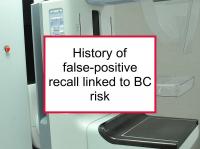There has been a great deal of press about false positive mammograms and the unnecessary distress, diagnostic procedures, and cost they cause. However, there are other less frequently reported aspects of this issue. For example, there is the problem of false negatives, in which existing breast tumors are not found on screening mammograms.
This causes some women to be diagnosed when their tumors are larger and at a later stage than they might have been. Another is the problem of "false" false positives, in which the abnormality seen during screening and determined to be benign upon additional testing turns out to have been the beginnings of breast cancer after all. Now a new study has reported that women who are recalled after a mammogram but found not to have breast cancer after further tests (i.e., who experience a false positive recall) are at higher subsequent risk of breast cancer.
One study estimated that one-third of women could have at least one false positive recall during a 20-year period of regular breast cancer screenings. Despite the obvious distress and other costs of such experiences, the study results below suggest that such women still should be diligent about getting screened annually thereafter.
Latest research finds false positive recalls are linked to greater risk
The study referenced above was designed to investigate breast cancer risk among women with a history of false positive recall after breast cancer screening, taking into account false negative results.
False negative results occur when screening detects existing breast cancer, but the cancer fails to be found upon diagnostic assessment. To conduct the study, the authors linked data from the Flemish breast cancer screening program to data in the national cancer registry for women aged 50 to 69. The study included 298,738 women, with average follow up of 6.9 years.
Women with a history of false positive recall were found to be at 2.11 times the risk of developing breast cancer compared to women without recall. However, 22% of the breast cancer cases that were diagnosed after false positive recall were found to be due to false negative diagnostic assessment. When these cases were excluded, the extra risk dropped to 1.69 times. These findings suggest there is room for improvement of diagnostic assessment. The risk associated with false positive recall was found to be higher among women with high breast density (BI-RADS 4 or 5).
The authors conclude that women with false positive recall have a subsequently increased risk of breast cancer risk compared to women without recall.
